The Police Act 1997 (Criminal Records)(Disclosure) Regulations (Northern Ireland) 2008
Laid before Parliament
5th March 2008
Coming into force
1st April 2008
The Secretary of State, in exercise of the powers conferred by the provisions which are specified in Schedule 1 to these Regulations, hereby makes the following Regulations–
Citation, commencement and extent
1.–(1) These Regulations may be cited as the Police Act 1997 (Criminal Records)(Disclosure) Regulations (Northern Ireland) 2008 and shall come into force on 1st April 2008.
(2) These Regulations extend to Northern Ireland only.
Interpretation
2.–(1) In these Regulations–
"the Secretary of State" means the Secretary of State for Northern Ireland; and,
"the Act" means the Police Act 1997().
(2) A requirement in these Regulations that any notification or representations should be in "writing" is satisfied where (apart from the usual meaning of that expression) the text of it–
(a)
is transmitted by electronic means;
(b)
is received in a legible form; and,
(c)
is capable of being used for subsequent reference.
Application form
3. The form set out in Schedule 2 to these Regulations, or a form to the like effect, is the prescribed form for the purposes of an application for a basic, standard or enhanced disclosure.
Fees for disclosures
4. The fee payable in relation to an application for the issue of a basic, standard or enhanced disclosure, is respectively £26, £28 and £30.
Basic disclosure: prescribed details
5. The following details of a conviction for the purposes of section 112(2)(a) of the Act are hereby prescribed:–
(a)
the date of the conviction;
(b)
the convicting court;
(c)
the offence; and
(d)
the method of disposal for the offence.
Relevant matters: prescribed details
6. The following details of a relevant matter for the purposes of sections 113A(3)(a) and 113B(9) of the Act (including those provisions as applied by sections 114(3) and 116(3) respectively) are hereby prescribed–
(a)
in the case of a conviction within the meaning of the Rehabilitation of Offenders (Northern Ireland) Order() including a spent conviction–
(i)
the date of the conviction;
(ii)
the convicting court;
(iii)
the offence; and
(iv)
the method of disposal for the offence;
(b)
in the case of a caution–
(i)
the date of the caution;
(ii)
the place where the caution was given; and
(iii)
the offence which the person given the caution had admitted.
Central records: prescribed details
7.–(1) Information in any form relating to convictions–
(a)
held in the criminal history database of the Causeway System; and
(b)
on a names index held by the National Police Improvement Authority for the use of police forces generally,
is hereby prescribed as "central records" for the purposes of section 112(3) of the Act.
(2) Information in any form relating to–
(a)
convictions held in the criminal history database of the Causeway System; and
(b)
convictions and cautions on a names index held by the National Police Improvement Authority for the use of police forces generally,
is hereby prescribed as "central records" for the purposes of section 113A(6) of the Act (including that provision as applied by sections 113B(3)(a), 114(3), and 116(3)).
Enhanced criminal record certificates: relevant police forces
8.–(1) For the purposes of an application for an enhanced criminal record certificate, "relevant police force" means–
(a)
the Police Service of Northern Ireland if–
(i)
the applicant resides or has resided within the period of 5 years preceding the date of the application within Northern Ireland;
(ii)
the applicant was born in Northern Ireland; and
(iii)
the applicant was convicted in Northern Ireland at any time;
(b)
the police force maintained for any police area in Great Britain–
(i)
within which the applicant resides or has resided within the period of 5 years preceding the date of the application;
(ii)
in which the applicant was born; or
(iii)
in which the applicant was convicted at any time;
(c)
such other police force as the chief officer of police of a police force identified as a relevant police force by virtue of paragraph (a) or (b) determines.
(2) In this regulation, "chief officer of police" means the chief officer of police in whose area the conviction was put on to the computer.
Enhanced criminal record certificates: prescribed purposes
9.–(1) The purposes for which an enhanced criminal record certificate may be required in accordance with a statement made by a registered person under section 113B (2)(b) of the Act, are prescribed as follows; namely, the purposes of–
(a)
considering the suitability of an individual for a position in any school within the meaning of Article 2 of the Education and Libraries (Northern Ireland) Order 1986();
(b)
considering an individual´s suitability for working in the Department of Education or the Department for Health, Social Services and Public Safety with access to sensitive or personal information about children or vulnerable adults;
(c)
considering an individual´s suitability for any work which is normally concerned with the provision of any form of information, advice or guidance wholly or mainly to children which relates to their physical, emotional or educational well-being and is provided by means of telephone or other forms of electronic communication including the internet and mobile telephone text messaging;
(d)
considering the applicant´s suitability for a position which involves regularly caring for, training, advising, counselling, supervising, or being in sole charge of persons aged under 18;
(e)
considering the applicant´s suitability for a position which involves regularly caring for, training, supervising or being in sole charge of a person aged 18 or over who is a vulnerable adult within the meaning given by paragraph (2) below;
(f)
considering the applicant´s suitability to hold a taxi driver´s licence under Article 79A of the Road Traffic (Northern Ireland) Order 1981();
(g)
registration under Part XI of the Children (Northern Ireland) Order 1995();
(h)
registration under Part III of the Health and Personal Social Services (Quality, Improvement and Regulation) (Northern Ireland) Order 2003() (regulation of establishments and agencies);
(i)
registration under Part 1 of the Health and Social Services Act (Northern Ireland) 2001() (social care workers);
(j)
placing children with foster parents in accordance with any provision of, or made by virtue of, the Children Act 1989() or the Children (Northern Ireland) Order 1995() or the exercise of any duty under or by virtue of, section 68 of that Act or Article 108 of that Order (welfare of privately fostered children);
(k)
a decision made by an adoption agency within the meaning of Article 2 of the Adoption (Northern Ireland) Order 1987() as to a person´s suitability to adopt a child;
(l)
considering an individual´s suitability to be included in, or to remain in, the health service list specified in paragraph (6) below;
(m)
considering–
(i)
the suitability of a director of a body corporate to be included in, or to remain in, sub-paragraph (b) or (c) of that list;
(ii)
the suitability of a member of a limited liability partnership to be included in, or to remain in, sub-paragraph (c) of that list; or,
(iii)
the suitability of a member of the body of persons controlling a body corporate (whether or not a limited liability partnership) to be included in, or to remain in, sub-paragraph (d) of that list;
(n)
considering the applicant´s suitability to work in a day care setting within the meaning of the Health and Personal Social Services (Quality, Improvement and Regulation)(Northern Ireland) Order 2003().
(2) The reference to a vulnerable adult in paragraph (1)(e) above is a reference to a person who is receiving services of a type listed in paragraph (3) and who, in consequence of a type listed in paragraph (4), has a disability of a type listed in paragraph (5).
(3) The services are–
(a)
accommodation and nursing or personal care in a residential care home or nursing home;
(b)
personal care or nursing or support to live independently in his own home;
(c)
any services provided by an independent hospital, independent clinic, independent medical agency or health services body;
(d)
personal social services; or,
(e)
any services provided in an establishment catering for a person with learning difficulties.
(4) The conditions are–
(a)
a learning or physical disability;
(b)
a physical or mental illness, chronic or otherwise, including an addiction to alcohol or drugs; or,
(c)
a reduction in physical or mental capacity.
(5) The disabilities are–
(a)
a dependency on others in the performance of, or a requirement for assistance in the performance of, basic physical functions;
(b)
severe impairment in the ability to communicate with others; or,
(c)
impairment in a person´s ability to protect himself from assault, abuse or neglect.
(6) The list referred to in paragraph (1)(l) above is any list prepared for the purposes of Part VI of the Health and Personal Social Services (Northern Ireland) Order 1972() of–
(a)
health care professionals undertaking to provide primary medical services;
(b)
persons undertaking to provide general dental services;
(c)
persons undertaking to provide general ophthalmic services; or,
(d)
persons undertaking to provide pharmaceutical services.
(7) In this regulation "residential care home", "nursing home", "independent clinic", "independent hospital" and "independent medical agency" all have the same meaning as in the Health and Personal Social Services (Quality, Improvement and Regulation)(Northern Ireland) Order 2003(); personal social services has the same meaning as in Article 2(2) of the Health and Personal Social Services (Northern Ireland) Order 1972(); health services body has the same meaning as in Article 48(4) of the Protection of Children and Vulnerable Adults (Northern Ireland) Order 2003().
Evidence of Identity
10.–(1) Applicants for a basic disclosure must provide all the information and supporting documentation as may be specified in the prescribed application form.
(2) Where the application is for a standard or enhanced disclosure, the person or body that countersigns the application shall verify the applicant´s identity in accordance with the Code of Practice for the time being in force.
Paul Goggins
Minister of State
Northern Ireland Office
27th February 2008
SCHEDULE 1
Enabling Powers
These Regulations are made under the following provisions of the Police Act 1997()–
(a)
sections 112(1)(a), 113B(9), 125(1) and (5);
(b)
having regard to the meaning of "prescribed" in section 125(1), in sections 112(1)(a), (2)(a) and (3), 113A(1)(a), (3)(a), 114(1)(a), 116(1)(a) and (b).
SCHEDULE 2
Access NI
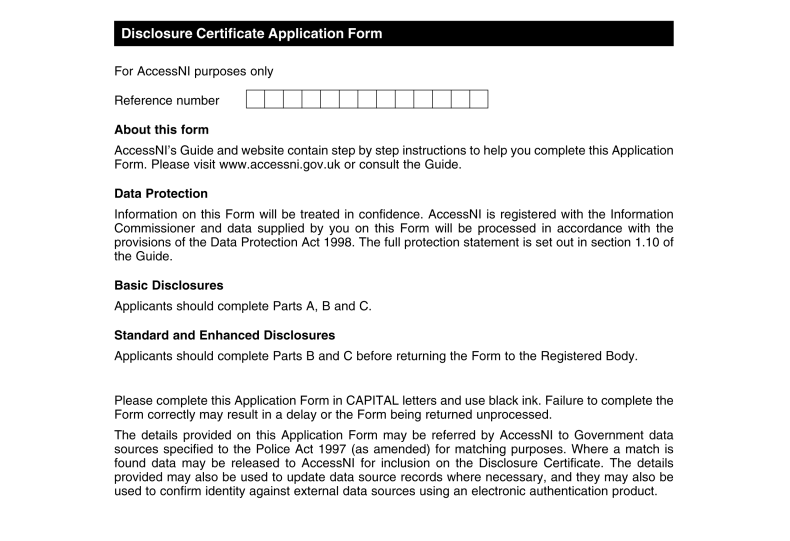
View a larger version of this image
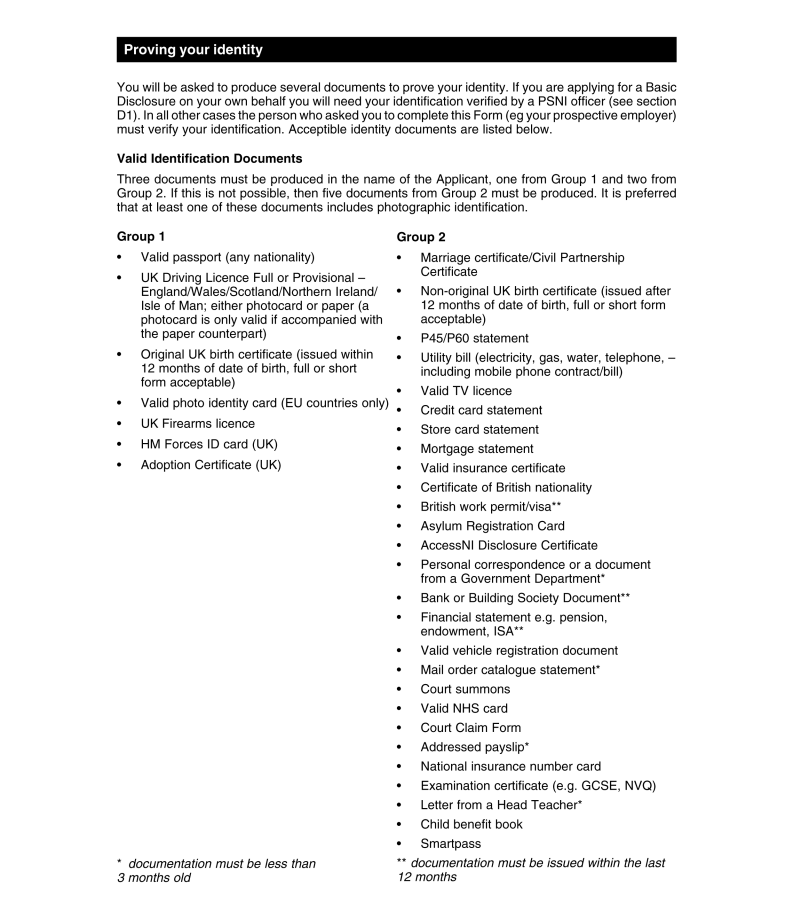
View a larger version of this image
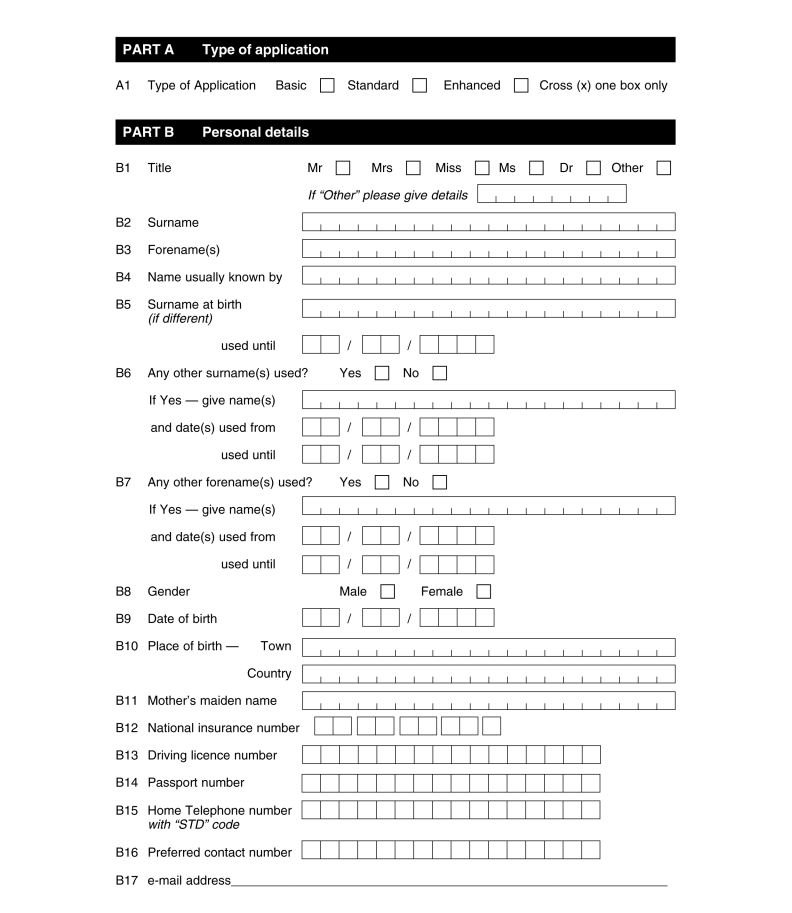
View a larger version of this image
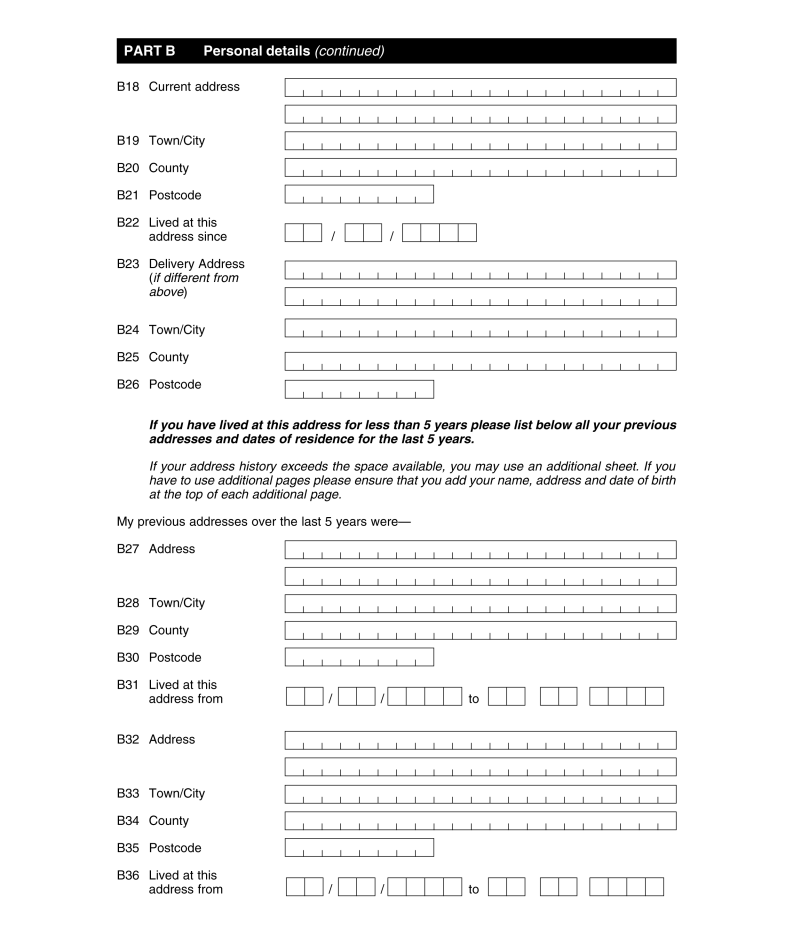
View a larger version of this image
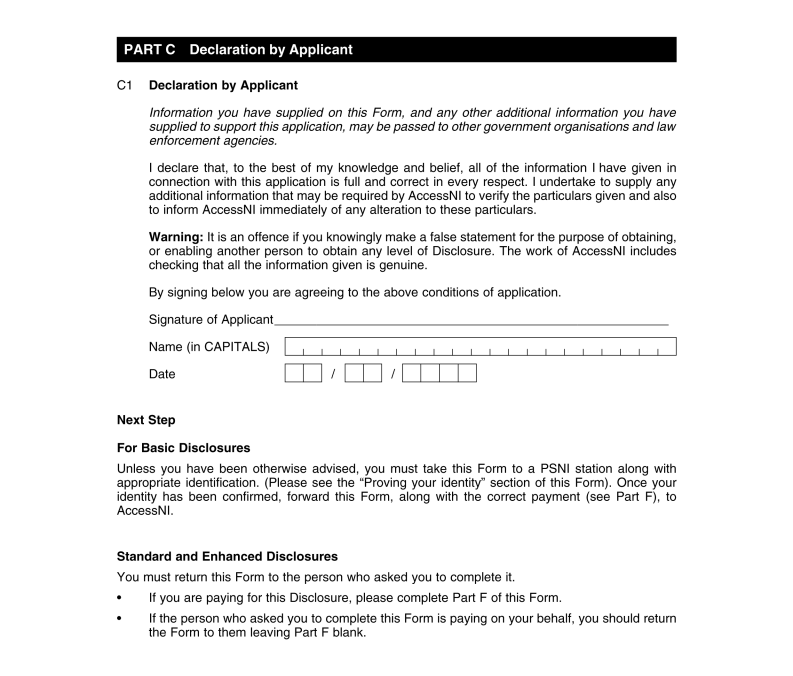
View a larger version of this image
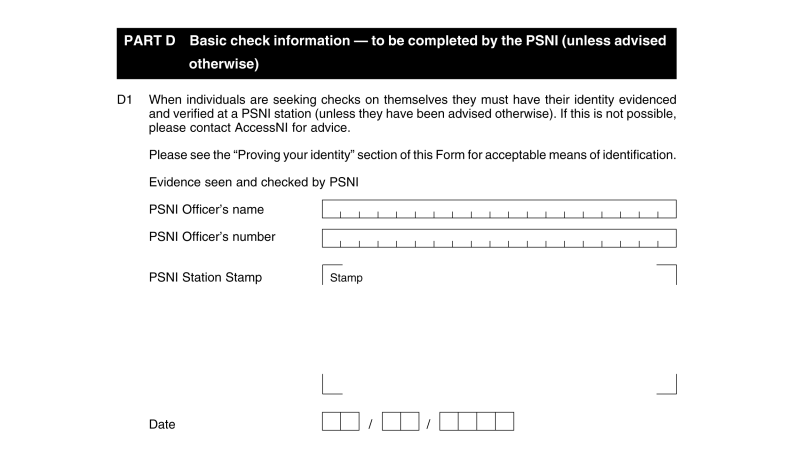
View a larger version of this image
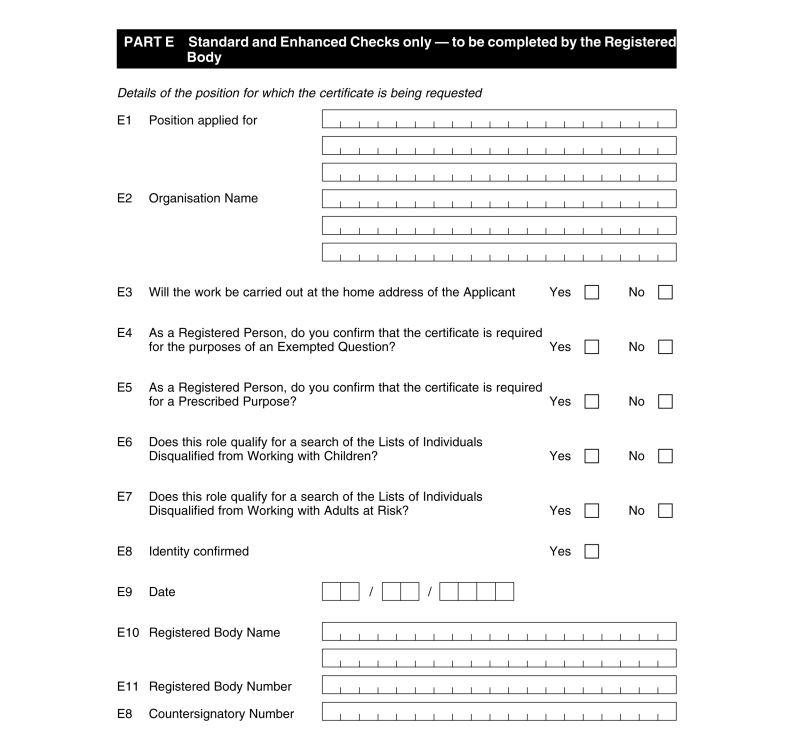
View a larger version of this image
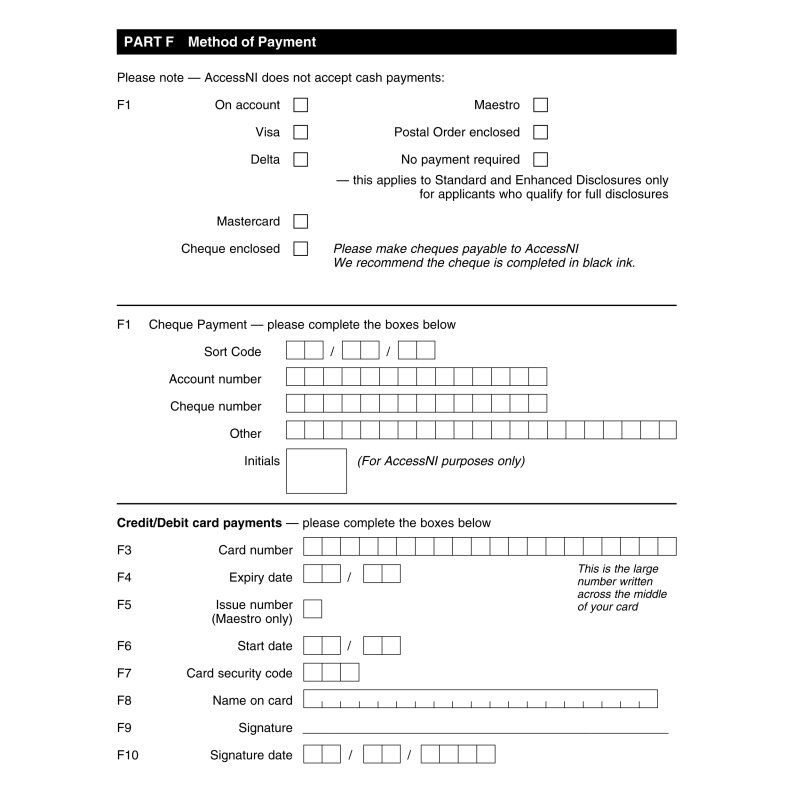
View a larger version of this image
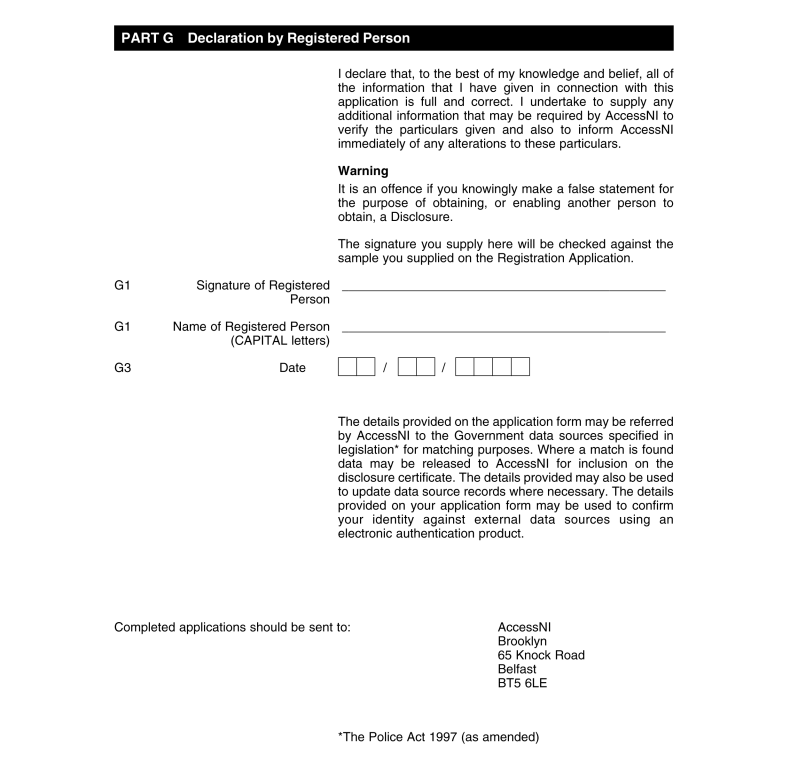
View a larger version of this image
Explanatory Note
These Regulations make detailed provisions in relation to applications for criminal conviction certificates, criminal record certificates and enhanced criminal record certificates under Part V of the Police Act 1997.
Regulation 3 requires an application for the issue of a criminal conviction certificate, criminal record certificate or an enhanced criminal record certificate to be made on the form, or one to like effect, set out in Schedule 2 to the Regulations.
Regulation 4 specifies the fee payable for each type of application
Regulation 5 prescribes the details of convictions which appear on criminal conviction certificates.
Regulation 6 prescribes the details of convictions and cautions which appear on criminal record certificates and enhanced criminal record certificates.
Regulation 7 prescribes the sources of information comprising central records for the purposes of certificates under Part V.
Regulation 8 defines "relevant police force" for the purposes of enhanced criminal record certificates.
Regulation 9 lists the prescribed purposes for which an enhanced disclosure is issued.
Regulation 10 requires the applicant to provide all appropriate information as requested in the application form and where the application is for a standard or enhanced check, it requires the person or body countersigning the application, to verify the applicant´s identity in accordance with the Code of Practice for the time being in force.

 View a larger version of this image
View a larger version of this image View a larger version of this image
View a larger version of this image View a larger version of this image
View a larger version of this image View a larger version of this image
View a larger version of this image View a larger version of this image
View a larger version of this image View a larger version of this image
View a larger version of this image View a larger version of this image
View a larger version of this image View a larger version of this image
View a larger version of this image View a larger version of this image
View a larger version of this image